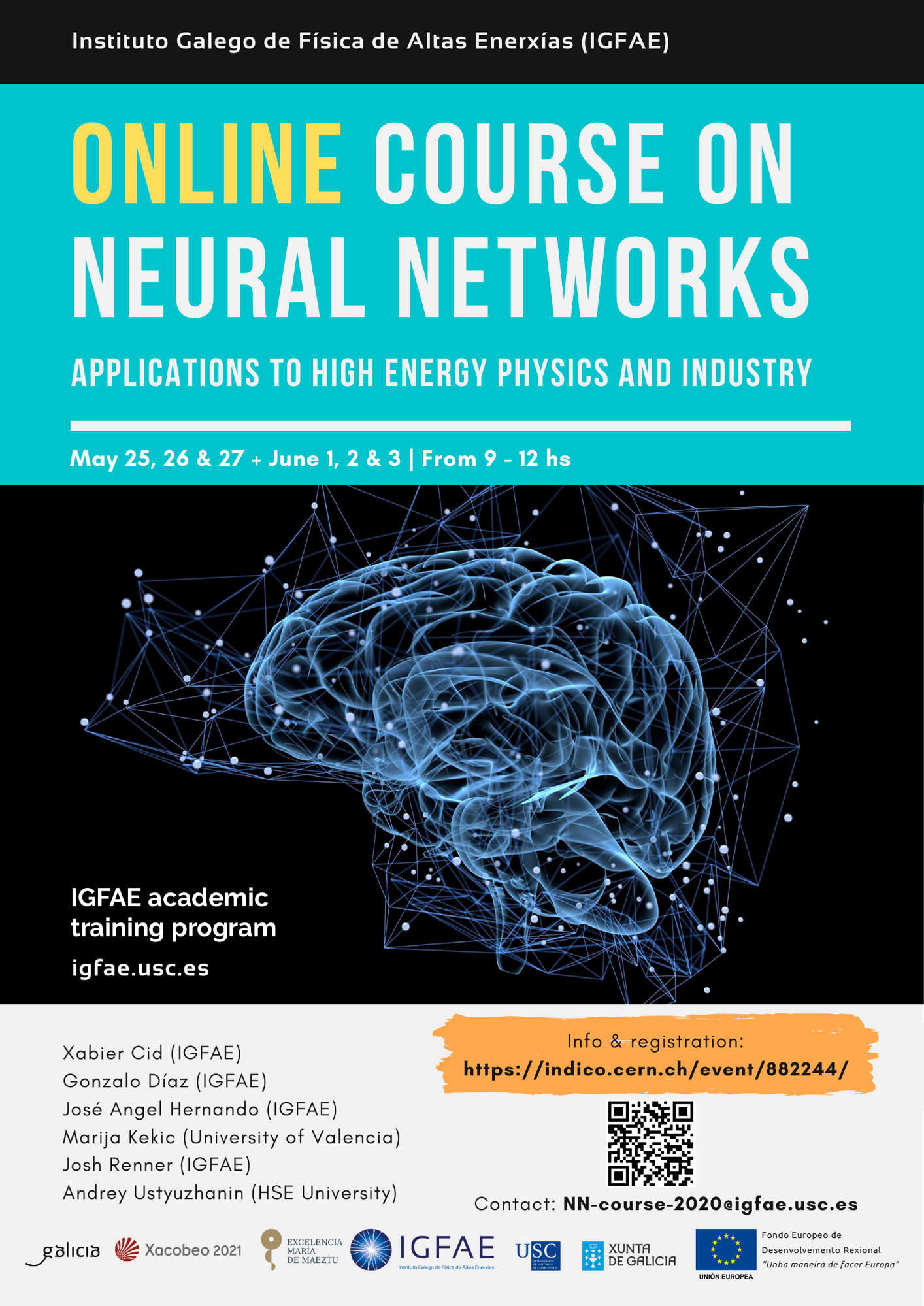- Compact style
- Indico style
- Indico style - inline minutes
- Indico style - numbered
- Indico style - numbered + minutes
- Indico Weeks View
Advanced Computing and Machine Learning
→
Europe/Zurich
Virtual (Microsoft Teams) (Instituto Galego de Física de Altas Enerxías (IGFAE))
Virtual (Microsoft Teams)
Instituto Galego de Física de Altas Enerxías (IGFAE)
, , , ,
Description
Artificial Neural Networks (ANNs) are computational models able to learn from previously provided datasets, constituting a different paradigm than classical computation algorithms in which tasks are run sequentially. This ability has allowed ANNs to produce accurate solutions to complex problems, such as image or sound recognition, that significantly outperform solutions based on classical computing. Their development has been aided by rapid improvements in hardware capabilities over the last two decades and is nowadays an active field of study whose applications extend far beyond academic research.
In this course, organized by the Instituto Galego de Física de Altas Enerxías (IGFAE), basic methods in machine learning and ANNs will be introduced at a conceptual and practical level, as well as some interesting applications in Particle Physics and industry. The course will take place virtually through Microsoft Teams in the mornings of 25th, 26th, 27th of May and 1st, 2nd and 3rd of June. It is aimed at researchers, teachers, CIT professionals and students.
Overview:
- Introduction to Neural Networks (Days 1, 2, 3)
- Applications in Particle Physics (Days 4 and 5)
- Applications in industry (Day 6)
Important requirements:
- Basic knowledge of statistics, Python and Jupyter Notebooks
Connection details:
- We will have live events in Microsoft Teams (no registration or account needed) and we will also create a team for you to join the hands-on sessions. This will be announced in due time.
To join the course every day at 9:00, click in the following links:
Day 1 [25/05/20]
Day 2 [26/05/20]
Day 3 [27/05/20]
Please, bear in mind we will be using the interactive rooms the second week of the course. You should be part of the specific Team created for this. If you've got problems joining, please let us know.
Connection details:
- Hands-on session link:
https://colab.research.google.com/github/HSE-LAMBDA/MLatUSC-2020
NEXT activity (Day 4):
- Slides: https://github.com/jerenner/uscnncourse/blob/master/CNNs_and_NEXT.pdf
- Code: https://colab.research.google.com/github/jerenner/uscnncourse/blob/master/next/NEXT_classification.ipynb
- Background information on the classification problem: https://jerenner.github.io/next-dnn-topology/
Participants
Adrian Casais Vidal
Adrián Cora
Alba Costa
Alberto García Martín-Caro
Alberto Rivadulla Sánchez
Alberto Saborido Patiño
Alberto Usón Andrés
Alejandro Vilar López
Alexandre Brea Rodriguez
Alicia Mosquera Rodriguez
Anxo Lema Saavedra
Araceli Domínguez Bugarín
Asier Pereiro Castro
Brais Palmeiro Pazos
Caetano Eirea Orro
Carlos A. Salgado
Carlos Hervés Carrete
Carmen Pajares
Cibran Santamarina Rios
Clara Dominguez Chapela
Daniele Musso
David Ferro Costas
Diego Martínez H.
Elisabet Galiana Baldo
Eloi Pazos Rial
Emilio Martinez-Nunez
Francisco García López
Gabriel García
Gonzalo Martínez Lema
Imanol Corredoira Fernandez
Iván Conde Leborán
Iván Martínez Suárez
Javier Garcia Pazos
Javier Mas Sole
Jose Luis Rodriguez Sanchez
juan ruso
Julian Lomba Castro
Julio Iglesias Fajin
Lois Fernandez Miguez
Lorena Dieste Maroñas
Manuel Fdez-Arroyo
Marcos Romero Lamas
Marcos Seoane
Maria Ruiz Ortega
Marta Rodríguez
Martín Calvelo Souto
María Rodríguez
Mauro Saavedra Golán
Miguel Fernández Gómez
Miguel Huidobro
Miguel Vidal
Monica Gonzalez
Mónica Canabal
Pablo Baladrón Rodríguez
Pablo Suárez Vieites
Petja Paakkinen
Rita Neves
Rubén del Mazo Rodríguez
Rubén Paredes García
Samuel Ferrero Losada
Sara Neira Castro
Saúl López Soliño
Sergio Calo Oliveira
Uxia Veleiro
Víctor López Pardo
Contact
